2016 上半年湖南教师资格初中英语学科知识与教学能力真
题及答案
注意事项:
1.考试时间 120 分钟,满分 150 分。
2.请按规定在答题卡上填涂、作答。在试卷上作答无效,不予评分。
一、单项选择题(本大题共 30 小题,每小题 2 分,共 60 分)
在每小题列出的四个备选项中选择一个最佳答案。请用 28 铅笔把答题卡上对应题目的
答案字母按要求涂黑。错选、多选或未选均无分。
1. Walnut trees __________ environment stresses such as drought by producing
significant amounts of a substance similar to aspirin.
A. turn to
B. confirm to
C. contribute to
D. respond to
2. John felt great __________ about his upcoming trip to Sidney; indeed, he could
hardly contain his enthusiasm.
A. unrest
B. uncertainty
C. anxiety
D. excitement
3. The professor's classroom manner was quite__________,never revealing the warmth
and playfulness she showed in private.
A. lively
B. amiable
C. formal
D. cheerful
4. Again as __________ in this experiment, he didn' t lose heart.
A. he failed
B. did he fail
�
C. he did fail
D. had he failed
5. Taiwan lies _________ the east of Fujian and is larger than _________ island in
China.
A. to; any
B. in; any
C. to; any other
D. in; any other
6, Johnson is a man of great experience, _________ much can be learned.
A. for whom
B. for which
C. from that
D. from whom
7. Which of the following shows the correct sentence stress in normal cases?
A. His 'brother is my 'best Mend.
B. They 'help one 'another in their work.
C. They have 'been in the 'countryside recently.
D. She 'thought herself 'better 'than 'anyone else.
8. The phrase "_________" exemplifies the incomplete plosion at the junction of
words.
A. good morning
B. black shirt
C. delicious cherry
D. beautiful jacket
9. The synonymous pair "_________" differ in degree of formality.
A. pass away and pop off
B. accuse and charge
C. poison and jail
D. tap and faucet
10. When using the imperative "Turn it off" to give an order, the speaker highlights
�
the _________of the utterance.
A. locutionary act
B. illocutionary act
C. perlocutionary act
D. indirect speech act
11. Fluent and appropriate language use requires knowledge of_________ and this
suggests that we should teach lexical chunks rather than single words.
A. connotation
B. denotation
C. morphology
D. collocation
12. "Underlining all the past form verbs in the dialogue" is a typical exercise
focusing on_________.
A. use
B. form
C. meaning
D. function
13. Which of the following activities may be more appropriate to help students
practice a new structure immediately after presentation in class?
A. Role play.
B. Group discussion.
C. Pattern drill.
D. Written homework.
14. When teaching students how to give appropriate responses to a congratulation
or an apology,the teacher is probably teaching at _________.
A. lexical level
B. sentence level
C. grammatical level
D. discourse level
15. Which of the following activities can help develop the skill of listening for
�
gist?
A. Listen and find out where Jim lives.
B. Listen and decide on the best title for the passage.
C. Listen and underline the words the speaker stresses.
D. Listen to pains of words and tell if they are the same.
16. When an EFL teacher asks his student "How do you know that the author liked the
place since he did not tell us explicitly?", he/she is helping students to reach
_________ comprehension.
A. literal
B. evaluative
C. inferential
D. appreciative
17. Which of the following types of questions are mostly used for checking literal
comprehension of the test?
A. Display questions.
B. Rhetorical questions.
C. Evaluation questions.
D. Referential questions.
18. Which of the following is a typical feature of informal writing?
A. A well-organized structure is preferred.
B. Short and incomplete sentences are common.
C. Technical terms and definitions are required.
D. A wide range of vocabulary and structural patterns are used.
19. Peer-editing during class is an important step of the _________ approach to
teaching writing.
A. genre-based
B. content-based
C. process-oriented
D. product-oriented
20. Portfolios, daily reports and speech delivering are typical means of _________.
�
A. norm-referenced test
B. criterion-referenced test
C. summative assessment
D. formative assessment
请阅读 Passage 1。完成第 21-25 小题。
Passage 1
Sante re, New Mexico multimillionaire Fortest Fenn has always loved a good adventure.
As a small child before eight, he and his brother, Skippy spent summer vacations
making exploration in Yellowstone National Park.
As a teen, Fenn idolized the decorated World War II fighter pilot, called Robin Olds
and latter emulated his hero during The Vietnam War as an Air fighter pilot to go
to New Mexico and settled there as an arts and antiques dealer, hunting down valuable
paintings, rugs, war memorabilia, and other antique to sell.
In 1998, Fenn was diagnosed with terminal kidney cancer. As he had always been doing,
he conceived a grand adventured that he assumed would be his last one."I wanted to
create some excitement, some hope, before I died," says Fenn,82, adding that he also
wanted to "get kids out of the game room and offthe couch." With those ideas in his
mind, he started to devise a treasure hunt.
Little by little, Fenn began stocking a small bronze chest with gold coins,
prehistoric bracelets and other valuable things. When his cancer went into remission
in 1993, he decided he would carry out his plan anyway.
In 2010, Fenn topped offthe chest with jewels and valuable stones and hid it somewhere
deep in the Rocky Mountains, north of Sante Fe. Later that year, he wrote a poem
for his self-published memoir, The Thrill of the Chase. It contained nine clues about
the treasure box' s whereabouts. One stanza reads like this: Begin it where warm
waters halt/And take it in the canyon down/Not far, but too far to walk/Put in below
the home of Brown.
A few months later, a story about the treasure appeared in a magazine. Since then,
Fenn has received thousands of e-mails from treasure hunters. Some request more clues
to the box. But mostly"people thanked me for bringing their family together," he
�
says with a self-comforting smile on his face.
In April, Fenn told a crowd at an Albuquerque bookstore that two groups of treasure
hunters had gotten within 500 feet of the chest. "They walked right by it," he said.
Fenn is confident that the treasure will be unearthed eventually and says i_t will
take the right combination of cunning and perseverance. "It will be discovered by
someone who has read the clues carefully and successfully. But nobody is going to
happen upon it," he predicts.
He hopes that whoever finds the loot will relish the riches and the adventure of
finding them.
21。 Who was a fighter pilot during the Vietnam War according to the passage?
A. Skippy.
B. Robin Olds.
C. Sante Fe.
D. Forrest Fenn.
22.Which of the following is closest in meaning to the underlined phrase"topped
off"in PARAGRAPH FIVE?
A. Filled.
B. Covered.
C. Fixed.
D. Decorated.
23. Why did Fenn design a treasure hunt after he was diagnosed with cancer?
A. He enjoyed adventures and couldn' t help doing it.
B. He wanted to help himself and game- and telly-addicted kids.
C. He wanted to get the kids out of the game room to play with him.
D. He thought it could bring him hope, excitement and a longer life.
24. What did Fenn enjoy most from treasure hunters according to the passage?
A. Their requests about more clues.
B. Their tremendous interest in the game.
C. Their news about getting their family closer.
D. Their numerous emails about their perseverance.
�
25. What does the underlined word "it" in the last but two paragraph refer to?
A. The riches.
B. The treasure.
C. The adventure.
D. The treasure discovery.
请阅读 Passage 2。完成第 26~30 小题。
Passage 2
The Ancient Greek philosopher Pythagoras is best known today for his mathematical
theorem,which haunts the dreams of many geometry students, but for centuries he was
also celebrated as the father of vegetarianism. A meatless diet was referred to as
a "Pythagorean diet" for years, up until the modem vegetarian movement began in the
mid-1800s.
While Pythagoras was an early proponent of a meatless diet, humans have been
vegetarians since well before recorded history.Most anthropologists agree that
early humans would have eaten a predominantly plant-based diet;after all,plants
can’t run away.Additionally,our digestive systems resemble those of herbivores
closer than camivorous animals.Prehistoric man ate meat,of course,but plants formed
the basis of his diet.
Pythagoras and his many followers practiced vegetarianism for several reasons,
mainly due to religious and ethical objections.Pythagoras believed all living beings
had souls.Animals were no exception , SO meat and fish were banished from his
table.Strangely enough,he also banished a vegetable that has a place of honor on
most vegetarian menus today,the humble bean.His followers were forbidden to eat
or even touch beans,because he thought beans and humans were created from the same
material.Fava beans were especially bad,as they have hollow steams that could allow
the souls of the dead to travel up from the soil into the growing beans.
While the edict against beans was lifted not long after Pythagoras’death,his
followers continued to eat a meatless diet.His principles influenced generations
of academics and religious thinkers , and it was a group of these like-minded
individuals who founded the Vegetarian Society in English in the mid-1800s.The
�
virtues of temperance,abstinence and self.control were all tied to vegetarian
Ideals,while lust,drunkenness and general hooliganism all resulted from a diet
too rich in meat products.Notable early vegetarians included Leo Tolstoy,George
Bernard Shaw,Mahatma Gandhi and American Bronson Alcott, a Transcendentalist
teacher,reformer and the father of“Liale Women”author Louisa May Alcott.
It wasn’t until the 1960s that vegetarianism moved into mainstream American life
and the movement’s growth picked up speed in the l 970s when a young graduate student
named Francis Moore Lappe wrote a book called Diet for a Small Planet.In it,she
advocated a meatless diet not for ethical or moral reasons,but because plant-based
foods have much less impact on the environment than meat does.Today,many vegetarians
refuse meat because of animal rights issues,or concerns over animal treatment,
a principle first espoused in Peter Singer’s 1975 work A nimal Liberation.
26. Which of the following statements fails to be inferred from the passage?
A. A meatless diet was supported and practiced by Pythagoras.
B. After his death, Pythagoras' followers continued to eat beans.
C. Pythagoras influenced a lot of people who chose not to eat meat.
D. Pythagoras refused to eat any meat for religious and ethical reasons.
27. Which of the following is closest in meaning to the underlined word in PARAGRAPH
THREE?
A. Evil.
B. Palatable.
C. Plain.
D. Notorious
28. What issue were vegetarians in the mid-1800s in England primary reason with when
refusing to eat meat?
A. Environmental protection.
B. Animal rights.
C. Religious belief.
D. Moral purity.
29. Which of the following is true according to the passage?
�
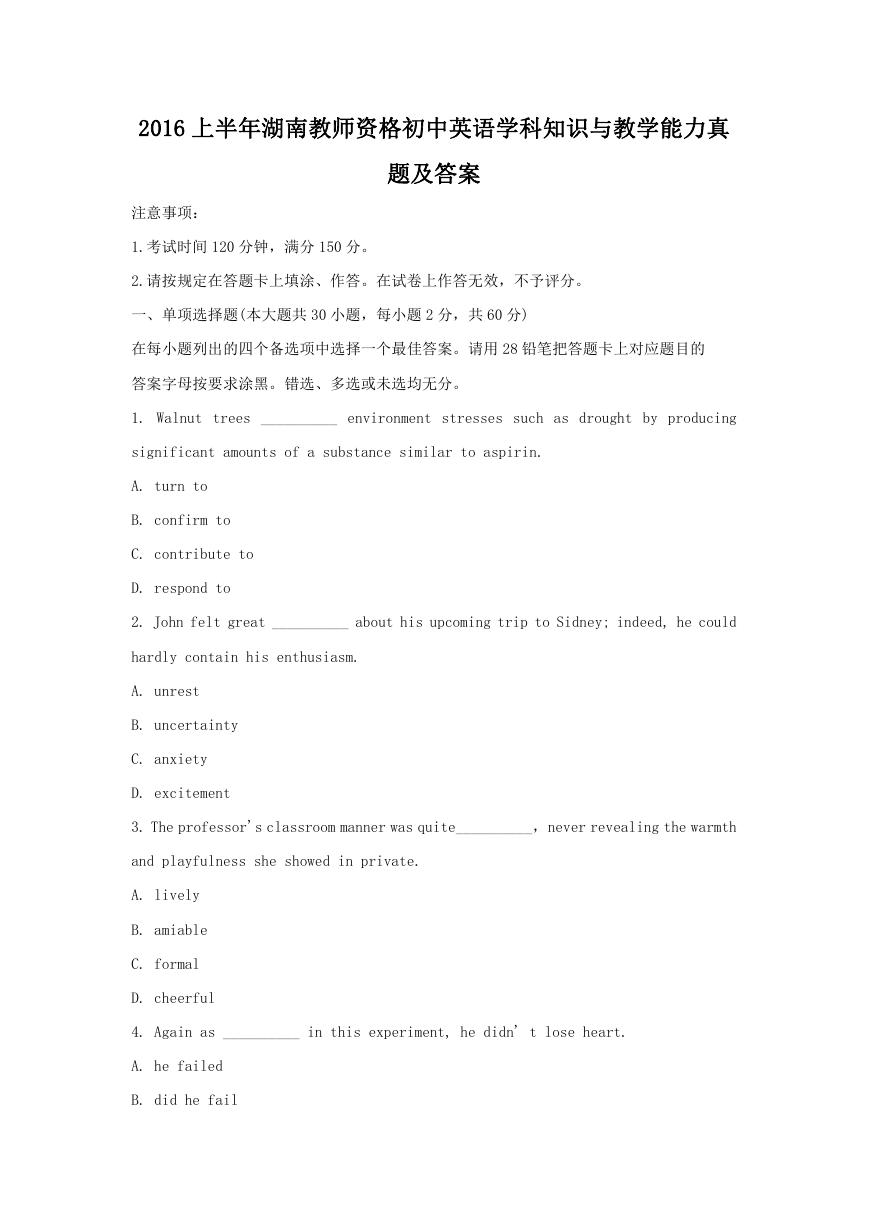
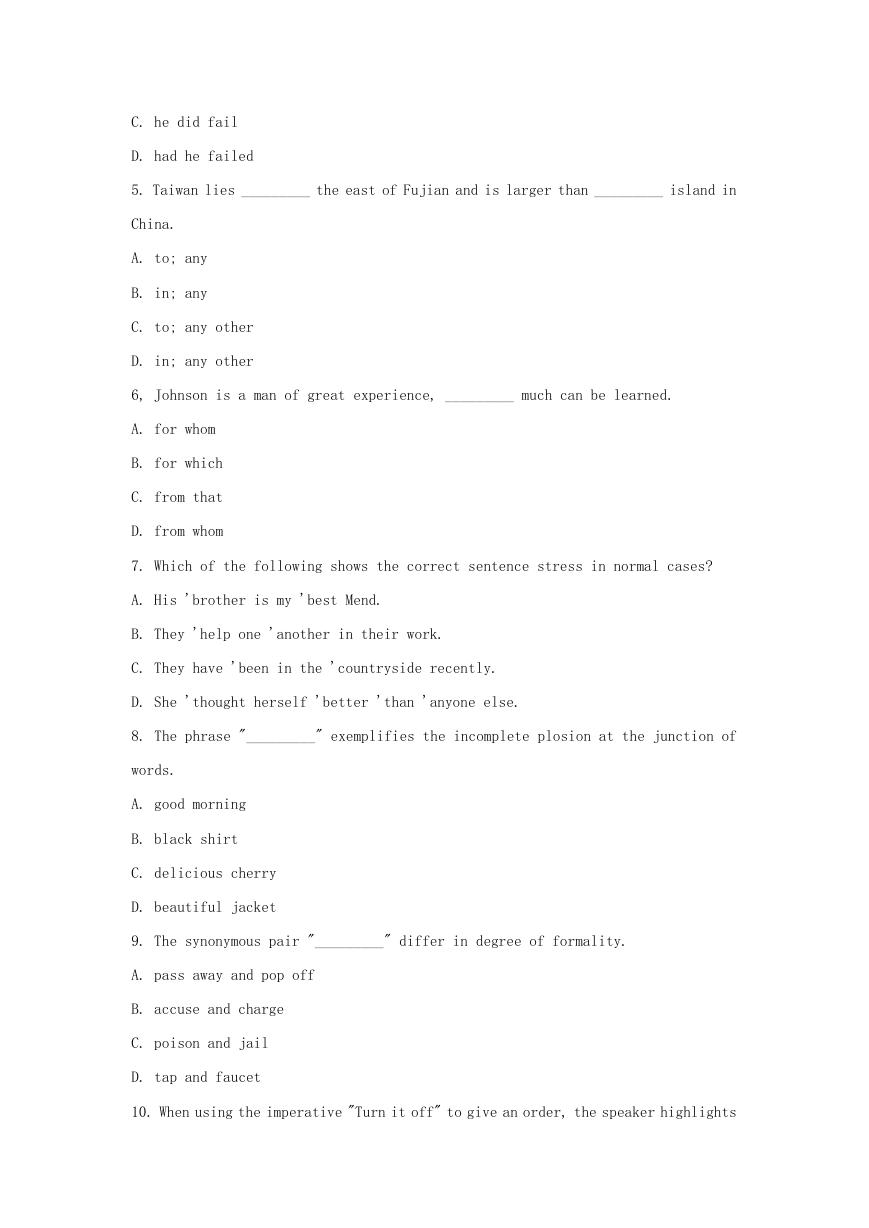
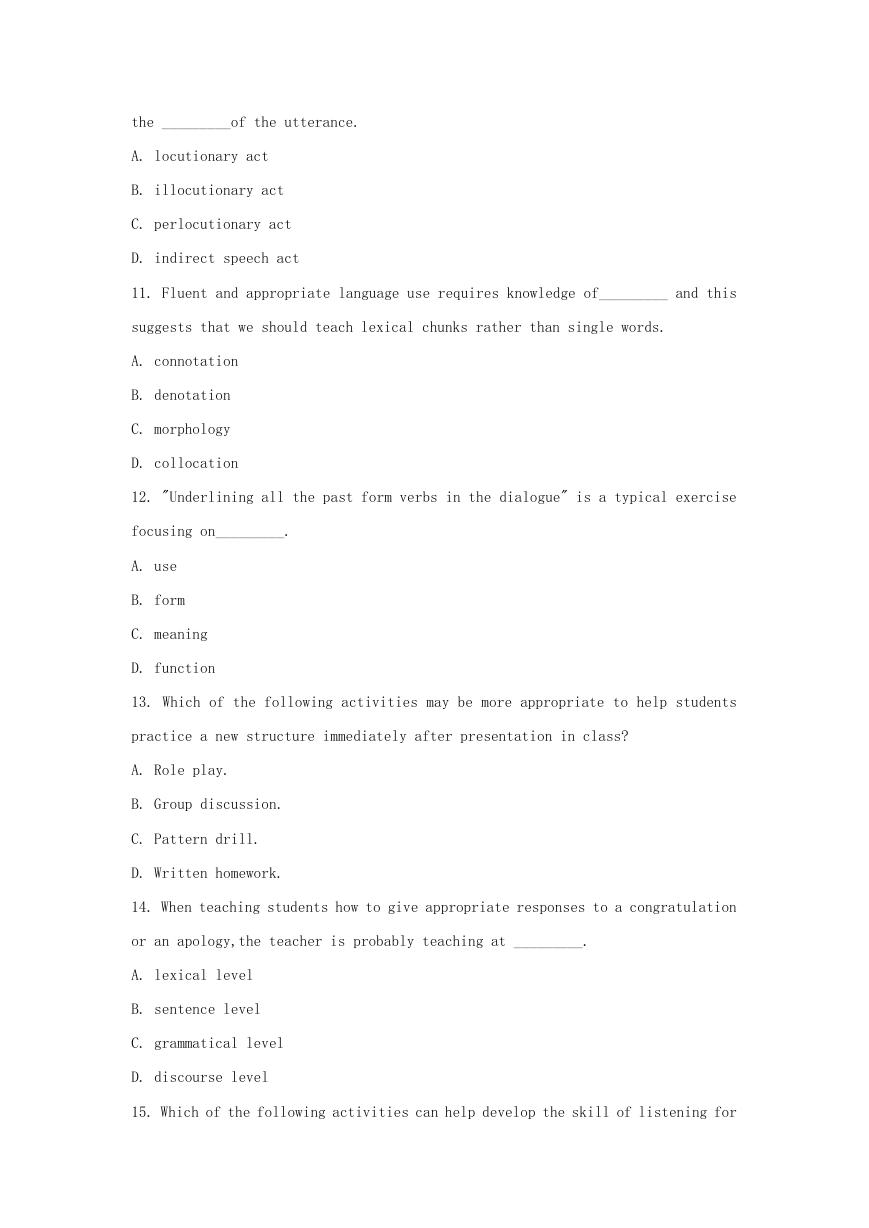
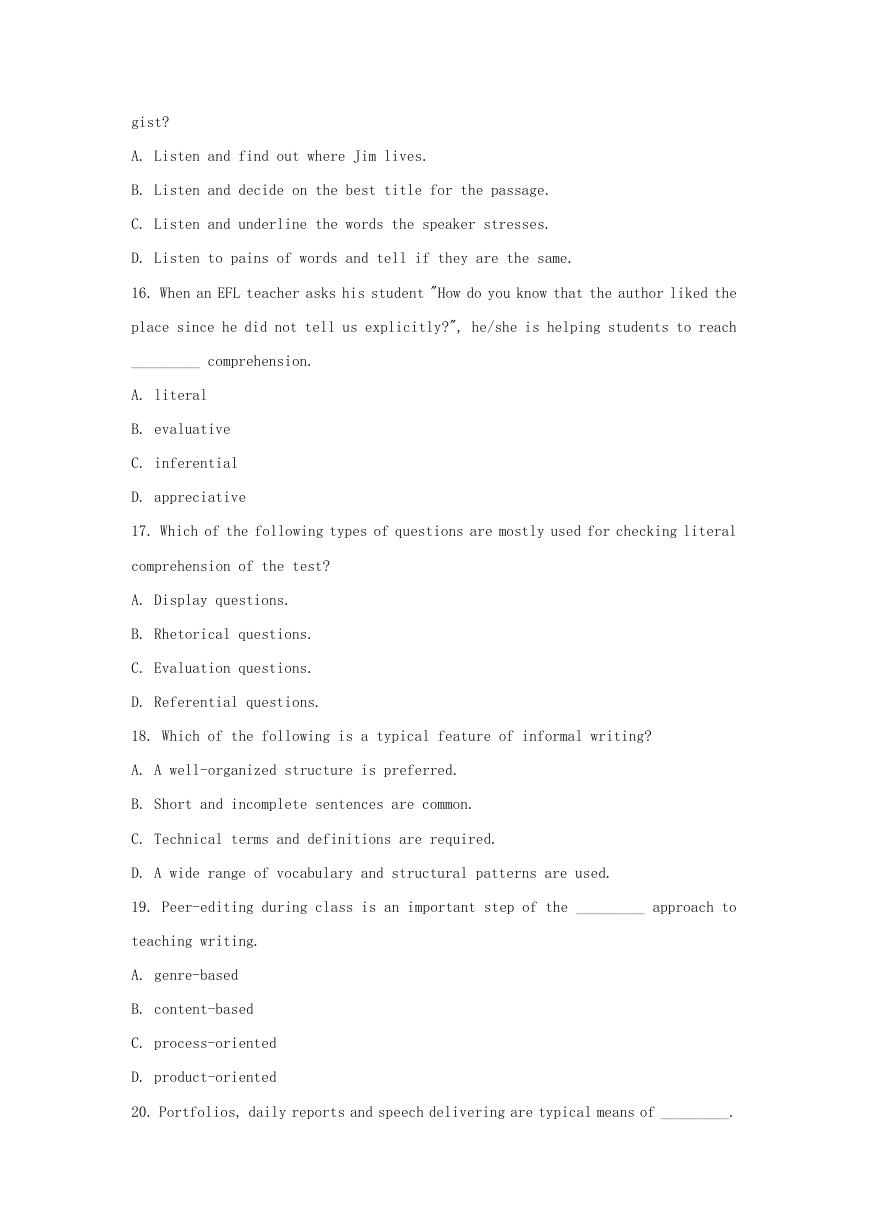
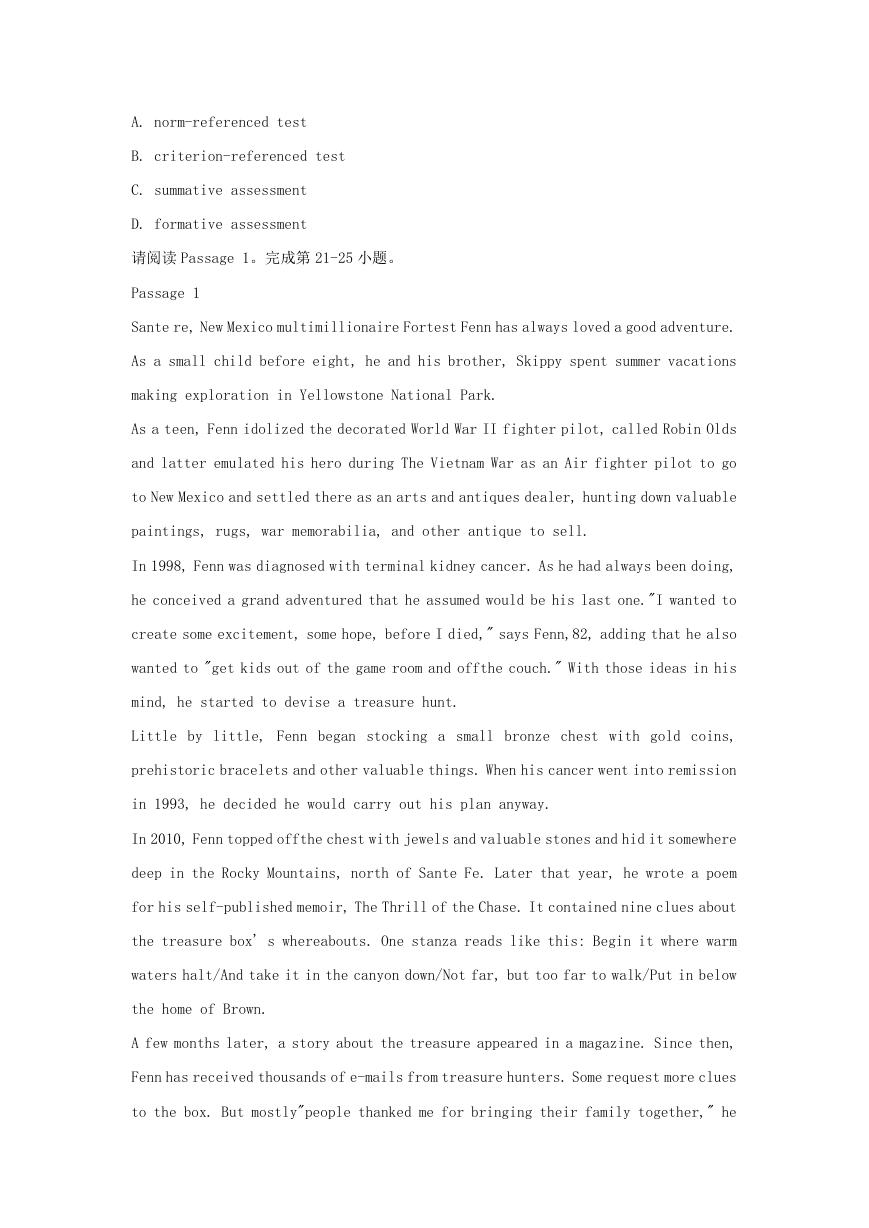
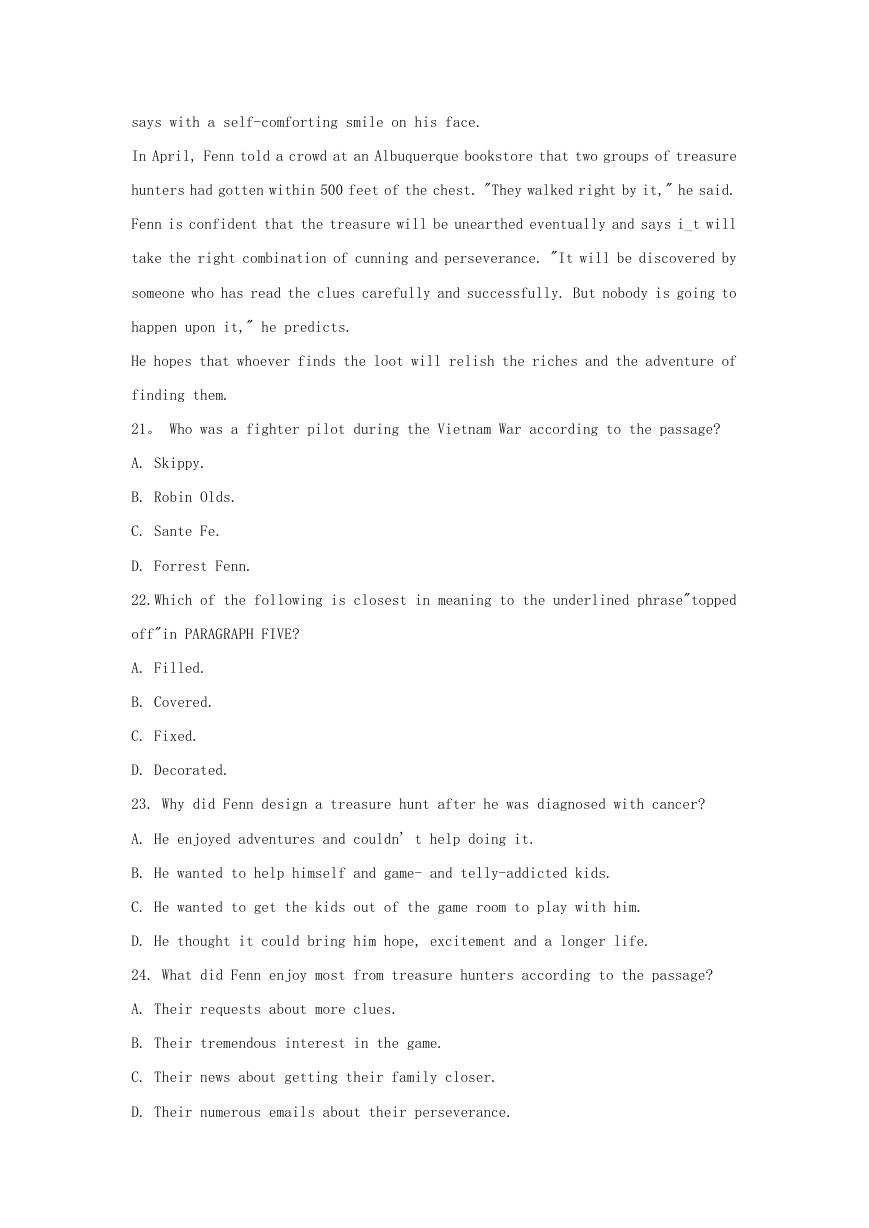
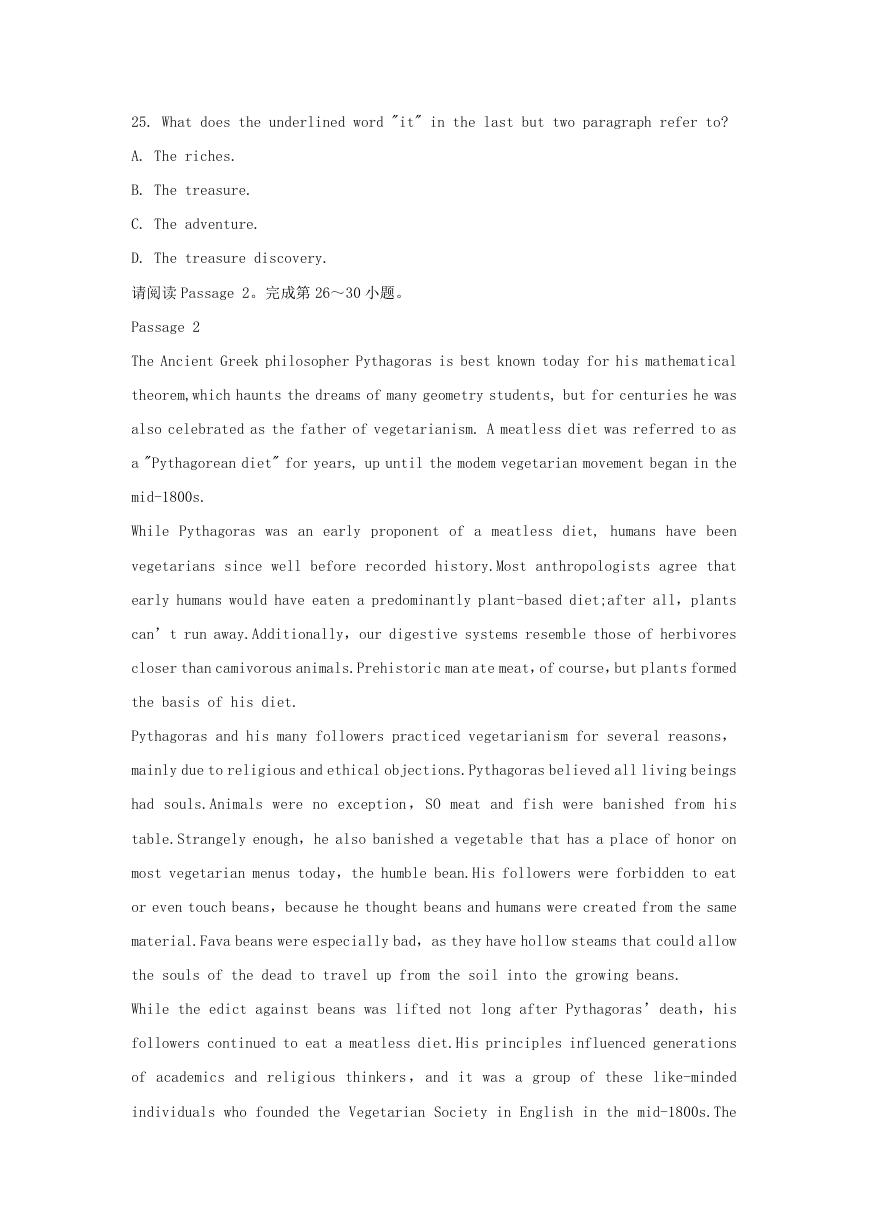
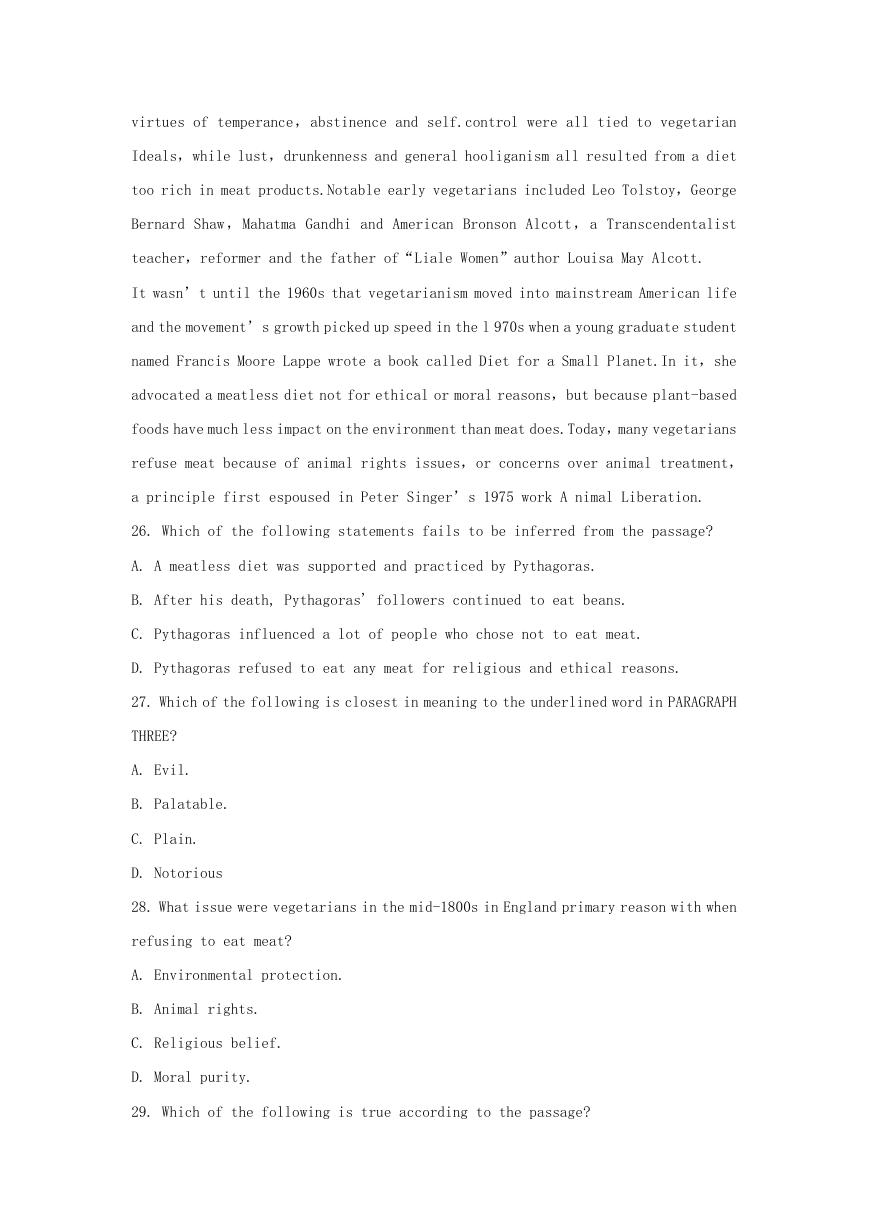








 2023年江西萍乡中考道德与法治真题及答案.doc
2023年江西萍乡中考道德与法治真题及答案.doc 2012年重庆南川中考生物真题及答案.doc
2012年重庆南川中考生物真题及答案.doc 2013年江西师范大学地理学综合及文艺理论基础考研真题.doc
2013年江西师范大学地理学综合及文艺理论基础考研真题.doc 2020年四川甘孜小升初语文真题及答案I卷.doc
2020年四川甘孜小升初语文真题及答案I卷.doc 2020年注册岩土工程师专业基础考试真题及答案.doc
2020年注册岩土工程师专业基础考试真题及答案.doc 2023-2024学年福建省厦门市九年级上学期数学月考试题及答案.doc
2023-2024学年福建省厦门市九年级上学期数学月考试题及答案.doc 2021-2022学年辽宁省沈阳市大东区九年级上学期语文期末试题及答案.doc
2021-2022学年辽宁省沈阳市大东区九年级上学期语文期末试题及答案.doc 2022-2023学年北京东城区初三第一学期物理期末试卷及答案.doc
2022-2023学年北京东城区初三第一学期物理期末试卷及答案.doc 2018上半年江西教师资格初中地理学科知识与教学能力真题及答案.doc
2018上半年江西教师资格初中地理学科知识与教学能力真题及答案.doc 2012年河北国家公务员申论考试真题及答案-省级.doc
2012年河北国家公务员申论考试真题及答案-省级.doc 2020-2021学年江苏省扬州市江都区邵樊片九年级上学期数学第一次质量检测试题及答案.doc
2020-2021学年江苏省扬州市江都区邵樊片九年级上学期数学第一次质量检测试题及答案.doc 2022下半年黑龙江教师资格证中学综合素质真题及答案.doc
2022下半年黑龙江教师资格证中学综合素质真题及答案.doc